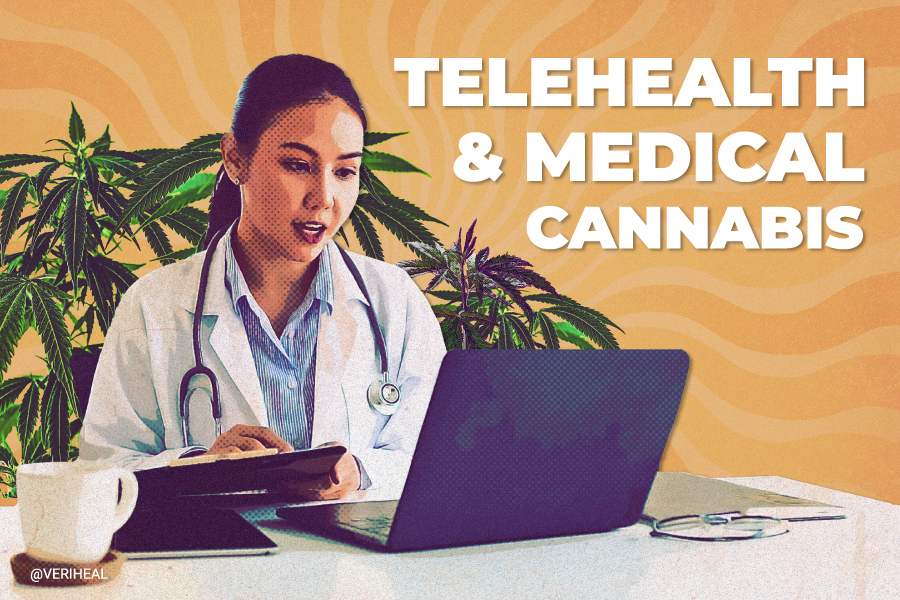There have been a lot of changes in the past five years in the healthcare realm, both at home and abroad. Medical cannabis is now legal in 37 states, the District of Columbia, and four out of five occupied territories.
How average people access healthcare has shifted enormously with the occurrence of the COVID-19 pandemic, which forced many to discover and utilize effective methods to carry on daily life at a distance, including doctor visits. Many turned to technology for solutions—which has been reflected in the sheer number of people who have used and continue to use telemedicine services regularly since 2020.
The Rise of Telehealth and Expansion of Medical Cannabis
Telehealth utilization has stabilized at levels 38 times higher than before the pandemic, putting its usage at an all-time high. According to a report by Allied Market Research, the global telemedicine market is expected to reach $431,823 million by 2030, growing at a compound annual growth rate (CAGR) of 25%. It’s safe to say that telemedicine is here to stay.
Another industry that has seen tremendous growth despite the economic downturn during the height of the COVID-19 pandemic is the cannabis industry. Based on data gathered, there are an estimated 3.6 million medical marijuana patients in the United States registered in their respective states as of 2021—a significant increase in the past decade. A report published in 2015 assessing trends in the registered medical marijuana population concluded that rates of medical marijuana use have risen greatly since 2009.
The expansion of medical cannabis programs throughout the country and the increasingly widespread availability and usage of telemedicine have begun to shape each other and will no doubt continue to do so going forward.
In fact, during the pandemic, which spurred telemedicine use and cannabis sales alike, some states with legal cannabis programs—e.g., Colorado—gave medical cannabis-specific telemedicine the green light. More than two dozen states temporarily permitted the prescription of medical cannabis via telehealth. However, as things slowly return to normal, most states have rolled back these changes. Both doctors and patients are sad to see these services go, and for good reason.
Telehealth Expands Accessibility for Medical Cannabis Patients
The main way that telehealth is helping expand accessibility for medical cannabis patients is the same way that it helps general medical patients. It increases the possibility for doctors to be in multiple places at once, enabling them to serve a much larger population and have a larger impact on wellness.
Getting your medical cannabis card and finding a licensed physician in your state who prescribes cannabis can be a complicated process with lots of red tape and state-specific rules that must be navigated. For the average person who works, has a family, goes to school, etc., this can be too time-consuming to pursue alone.
Telehealth platforms like Veriheal can help patients navigate this daunting process at home on their own schedule. Telemedicine services can be specifically advantageous for the elderly, other individuals with mobility issues, or patients who may be homebound for other reasons.
Barriers to Access and Inclusion: Cannabis and Telemedicine
The main barrier that prevents people from using telehealth platforms like Veriheal to get access to medical cannabis is not technological—although the digital divide in America does present a problem for many—but more so a psychological block, specifically when it comes to education surrounding the cannabis plant.
Many patients across the U.S. appreciate Veriheal’s navigable platform, available resources, and ease of accessibility to medical marijuana. We also invest in research and creating educational resources and tools for consumers, because we know that it is essential to empower the public with information about cannabis to begin to break down some of these barriers.
A way to make the Veriheal platform even more inclusive and accessible to all patients is to continue to be aware of what’s going on in the world today both culturally and socially to make sure that our branding reflects the masses. This ensures that individuals can see themselves in our advertisements and messaging, as well as allows us to provide educational resources that are useful and relevant to patients looking to improve their health and wellbeing everywhere in the world.
Inclusivity and relevancy in messaging, education, and access is a continuous journey that we work at every day to help people obtain access to credible information and healthcare.
Looking Forward: Challenges and Opportunities in the Medical Cannabis and Telemedicine Space
State laws continue to change rapidly, and more states legalize medical cannabis every year. This presents opportunities for both patients and the industry. For patients, there is an opportunity to expand accessible care. For the industry, there are an increasing number of new markets to expand into.
However, the constantly changing landscape also presents challenges. Foremost, it’s difficult to keep up with the new legislation being introduced and passed across the country. The patchwork of regulations that changes with every state line can be nightmarish to navigate for patients, practitioners, and businesses alike.
Telemedicine introduced a new wave of healthcare with the COVID-19 pandemic and is no doubt here to stay. At Veriheal, it’s a priority to keep up with the news on policy, the cannabis industry, and emerging research—as well as invest in producing our own research reports—in order to provide the public with credible resources in addition to helping facilitate access to healthcare.
For companies that do business specifically in the telemedicine and medical cannabis space, it is imperative to invest in research, development, and technology to continue improving services, keeping up with changing regulations, and staying relevant with the times.
Author, Share & Comments
















